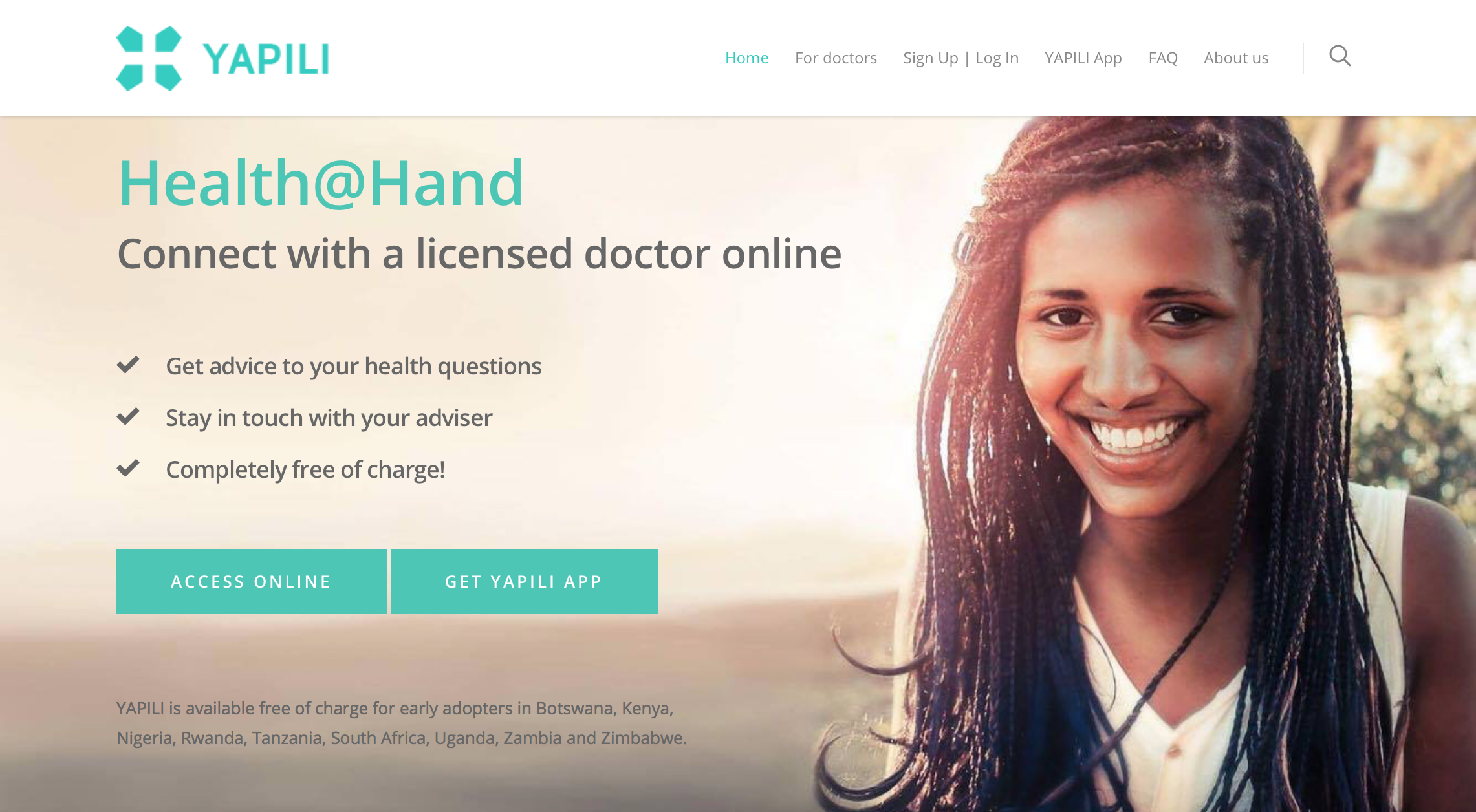We are happy to introduce to you today Enya Seguin, CEO and Co-Founder of YAPILI, a tele-health platform start-up from Netherlands.
1. First of all, can you introduce yourself to our readers, who you are, where you come from and what’s your background.
My name is Enya Seguin and I am the CEO and Co-Founder of YAPILI. I am originally from Canada and I have lived in different countries throughout my upbringing. I’m currently based in The Netherlands which is where I completed my studies in Policy Science & International Development, and where YAPILI is based.
2. What is your startup and where is it located?
YAPILI was incorporated in The Hague in 2016 following the first grant we received from the municipality here, as well as the endless business opportunities offered by this dynamic city! YAPILI means ‘second option’ in Swahili because our objective is to provide an alternative solutions to individuals and families seeking health advice across the African continent. YAPILI is a telehealth solution that connects African users to doctors anywhere in the world via our online platform and app. Our users are able to securely store their medical information on YAPILI in order to really own their health. Everything YAPILI offers is delivered through our user-centred scheme. Our objective is always to empower our users to gain autonomy, confidentiality and knowledge on their health. In the African societies where professional medical facilities are scarce, costly and stigmatised, YAPILI offers people new opportunities to establish confidential contact with local and international health care professionals in cases of pregnancy & family planning, diabetes, hypertension, HIV, sexual health, mental health and generic primary care. Users can access the service via the website https://yapili.com or via the YAPILI app on their smartphone. Our telehealth solution leverages the increasing use of mobile technology and connectivity across African countries, in order to empower the end users and to enhance access to healthcare. It is the only peer-to-peer health platform with integrated health records and one of the very first legal frameworks defined for cross-border health advice and data privacy.

3. What is the problem you are addressing and what is your solution?
Healthcare is a multifaceted problem in Africa that needs a multifaceted solution, which is why various actors within the healthcare ecosystem must become involved. No startup alone can solve all these problems with a scalable, sustainable and impactful solution. We need to work together. The problems YAPILI addresses are
as follows:
1) Lack of access to quality healthcare
2) Shortage of doctors in African countries
3) Misuse of social media for health advice
4) Stigma & discrimination regarding health issues 5) Paper/handwritten medical records
6) Poor health-analytics (due to lack of information)
Access to quality healthcare services is difficult for the vast majority of people in the African countries due to long distances, unaffordable fees and overcrowded health facilities. These are not only real barrier to healthcare in many African countries, these facts also have detrimental impact on incentivising individuals to seek help until they reach a critical point. YAPILI users can connect with specialists anywhere in the world to receive advice on managing a chronic illness or on mental health. YAPILI users can also connect with their own local doctors for simple follow-ups. This has the opportunity to uncluster public health facilities and reduce unnecessary referrals. Our users can also seek second opinions by a YAPILI-Advisor based in another country.
There is a lack of awareness and data collection on non-communicable diseases, such as cancer, diabetes and hypertension. YAPILI is delivering advice on lifestyle and dietary advice to its users, in an effort to educate and prevent against non-communicable diseases. We also hope to connect health professionals in Africa to specialists anywhere in the world to empower African health professionals to learn more about non-communicable diseases since these are emerging rapidly in many African countries.
Young people have an additional hurdle to take in accessing information on sexual and mental health due to the youth unfriendly sexual and reproductive health services, lack of awareness, stigma and discrimination.YAPILI provides them with a safe space from the comfort of their mobile device. Together with key partners, we will be able to certify YAPILI-Advisors as stigma-free.
The prominence of handwritten medical records is an issue, since patients must keep hold of handwritten records, which can easily be lost or forgotten. It has been reported in some countries that clinics can be reluctant to share their patients records and often view doctors notes from a different clinic as illegitimate or incomprehensible. Hence, we want to provide our users with full autonomy over their medical information.
Furthermore, our research has shown that thousands of Africans use social media to share health-related concerns. Facebook groups are often not equipped with health professionals, which means that many individuals can be misguided or misinformed. In the broader realm of public health, this phenomenon is causing false information to be diffused on social media. This perfectly exemplifies the broader problem: access to mobile technology and connectivity is growing faster than healthcare in many African countries. Our solution leverages these rapid developments to deliver Health@Hand!
4. What is your target market? And the market size?
There are 365 million online users on the African continent. There are 170 million Facebook users in Africa. From this data, 10% of these users are between 18-35 years old English speakers and have relatively good access to Internet. This signifies that our ‘serviceable available market’ is 41 million users and growing!
Our target market are emerging countries. YAPILI is not confined to borders, which has been demonstrated by our pilot project launching in 8 countries. For the next phases on our product roadmap we will narrow down to 3 key African markets.
But the sky is the limit! You could see YAPILI being active in Asia and Latin America in the near future. We built YAPILI on flexibility in order to accommodate our solution to the needs of specific contexts.
5. How has the traction been so far on the customer side?
With zero salaries and seed funding, we have onboarded over 1100 users from 8 African countries and over 100 doctors Africa, Europe & Asia since our launch in April 2017. This has been achieved with minimum online promotions on our Facebook page and offline promotion in Kenya, Nigeria and Botswana.
6. From the investment perspective, where are you at now?
We are actively seeking investment to launch the second phase of our product roadmap beyond the successful MVP and pilot project we launched over a year ago in 8 African countries.
7. What is your view about the startup scene in your countries and more regionally in Africa?
Many countries in Africa are booming and blossoming with innovation – way more than in Europe for example. Innovation derives from passion and determination, but
is also built from unresolved social struggles. Innovation is not a new phenomena, but it is increasingly being brought to a centre-stage as bigger companies in the healthcare industry are realising how impactful digital innovation can be. Health innovation in Africa has received more attention in the past six months than it has previously. As healthcare is a huge ecosystems, we need several parties to get involved. Since actions plans and funding is dangerously lacking amongst African governments, startups like ours are continuously seeking grants and strategic partnerships. However, it can be said that to reach a point of sustainability we will need government involvement to integrate healthtech solutions into national strategy.
8. Can you share with us 3 other startups in your country, that you find interesting, either from a product perspective, vision one or their founders?
As we are not affiliated with a single country, I would like to share 3 startups from different countries that I find fascinating. Agrocenta from Ghana, Giftedmom from Cameroon, and Vula from South Africa.
Thanks again for your time and let’s catchup in a few months to follow up on your milestones and development!
 We just launched our WhatsApp channel. Want to get the latest news from the Tech in Africa?
We just launched our WhatsApp channel. Want to get the latest news from the Tech in Africa?



